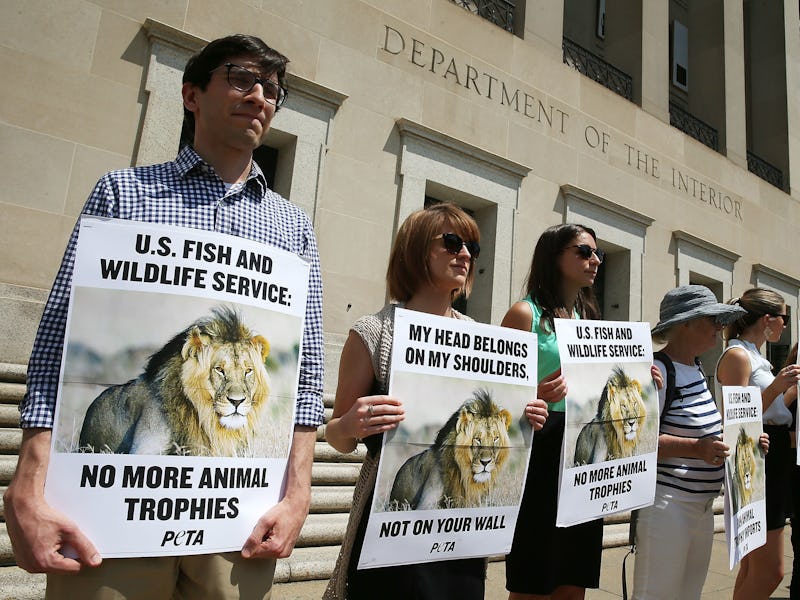Democrats' Trophy Hunt Paper Targets Cecil the Lion's Killers, Misses the Mark
Maybe pretend you care as much about African people as African animals?

The Democratic staff of the House Natural Resources Committee has issued a report challenging the claim that trophy hunts in Africa benefit species at risk. The report, titled “Missing the Mark,” attempts to make hay of the upcoming anniversary of the death of Cecil the Lion. It doesn’t succeed.
The report, which specifically examines the situation in Namibia, South Africa, Tanzania, and Zimbabwe, rightly notes that hunting and hunting fees do not necessarily support animal conservation. While hunting groups argue that trophy hunts are important because their viability depends on a healthy, sustainable population of animals, in reality the benefits are often unclear. “Claiming that trophy hunting benefits imperiled species is significantly easier than finding evidence to substantiate it,” the authors write. A well-regulated hunt might result in the conservation of animals and their habitat, but an unregulated one could result in a tragedy of the commons. When local guides compete aggressively for foreign dollars, hunters win and everyone else loses.
The U.S. government plays a role in African trophy hunts in that it regulates the import of the animal parts, or trophies, that result from the hunt. Given that, it’s not unreasonable for the United States government to demand proof that animal trophies imported into the country are killed in a way that benefits the species overall, especially if the animal is at risk for extinction. But the report goes beyond asking that trophy hunts occur only in areas where the animal in question’s population is rebounding. It asks for paternalistic policies that assume African governments, organizations, and communities cannot manage their own affairs. Worse, it takes the tone that African animal lives take precedence over the lives of African humans.
An exemption to the ban on hunting species at risk under the Endangered Species Act “cannot be met by showing the economic benefits hunting may provide to communities,” the authors write. “It is important to understand that while community based natural resource management (CBNRM) programs designed to support hunting and conservation can help make trophy hunting more sustainable, their mere existence does not guarantee that a trophy will meet the enhancement standard.”
A U.S. Fish and Wildlife official examines a shipment of hunting trophies being shipped from South Africa to the United States.
It is understandable that the Natural Resources Committee would put the focus on wildlife protection over community development, but in truth the two cannot be separated. Poaching occurs in places where the economic opportunities afforded by poaching outweigh opportunities elsewhere, and the same goes for habitat destruction. When the death of one lion generates more American tears than African wars, famines, and genocides, it’s not hard to see why African people might feel a little put off.
The report takes the angle that hunting in America is well regulated, and prioritizes conservation, but in Africa, not so much. “The United States has proven that well-regulated hunting can help conserve wildlife, even for threatened or endangered populations,” states the report’s conclusion. But in Africa? “In many cases, the laws, institutions, and capacity necessary to make trophy hunting benefit conservation are lacking,” the authors write. “Some analysts note that corruption within governments or organizations can prevent trophy hunting revenues from funding conservation activities and can even lead to the mismanagement of hunted populations.” And later, “Even in countries where corruption is relatively less prevalent, though, serious concerns linger about the ability of government officials to manage wildlife populations sustainably.”
Better to shut the whole thing down, for fear of doing harm to the animals, already in such dire straights, no?
“We have a responsibility to set an example for the rest of the world and make absolutely certain that Americans are not contributing to the decline of species already facing extinction or severe population loss,” the report concludes.
Here’s a better idea: Only allow import permits for trophies where it can be shown that that animal’s population is stable (for threatened species) or rebounding (for endangered species). Leave the micromanaging to folks on the ground, with actual knowledge of the situation. As the report authors rightly note, proving that any particular hunting program benefits conservation efforts is pretty hard to do. Proving an animal population is doing fine overall is a much more attainable and quantifiable goal. Set the bar high and ask other people to clear it.
Some people feel strongly that wanting to shoot an animal and put its head up as a trophy is a pretty fucked up thing to do, and maybe it is. But it’s important to at least hear the perspective of the hunters, who by and large consider themselves animal lovers and conservationists. It’s important, too, to not set a dichotomy where American hunting is good, and African hunting is bad. Finally, in considering conservation, we should consider who benefits from that conservation. Is it only for the benefit of wealthy foreigners who can afford guided hunts and safari tours, or does it truly support the needs and goals of communities who call that place home? Maybe this is not the priority of the American government and conservation groups, but maybe it should be.